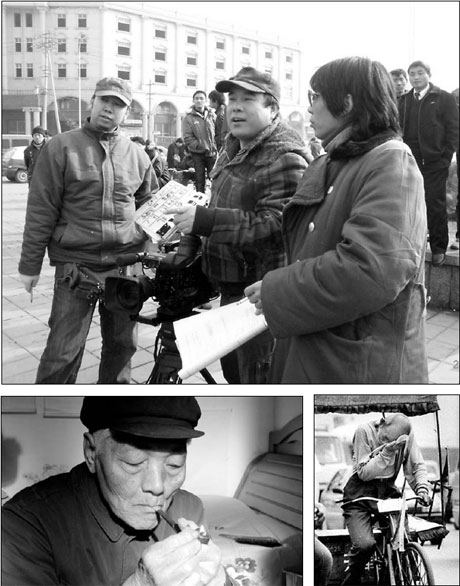Movie
Promise of the pedicab
Updated: 2011-07-13 07:52
By Sun Li (China Daily)
|
Top: Li Jialun (center) with crew members shooting the film Bai Fangli. Above: Veteran actor Huang Shaoquan stars as Bai Fangli in the movie. Above right: Bai Fangli drives his pedicab. Photos provided to China Daily |
Touched by the story of a pedicab driver, who donated all his earnings to help poor kids, a former advertising executive sells everything he has to make a film about him. Sun Li reports.
Unlike most people in the movie industry, who will do anything to fight piracy, film producer Li Jialun welcomes it. The 46-year-old former executive of a small, Tianjin-based advertising company, did not enter the film business until 2005. So far, only one movie of his has been shown to audiences, and that just twice on TV.
The film, Bai Fangli, based on the true story of its eponymous protagonist, an octogenarian pedicab driver who lived in Tianjin and financed more than 300 poor students with the money he earned by pulling his trishaw, marked Li's maiden film foray and cost him nearly all his assets.
A movie buff, Li used to take drama classes in his spare time and has played bit roles in a dozen films and TV series.
"I came to know of Bai Fangli in 1994 when I acted in a TV drama, whose hero was modeled after him," Li recalls.
"I learnt from the script that Bai, then 74, had already retired and returned to his hometown in Hebei province," Li says, adding that he was deeply impressed to learn that after he chanced upon some poor kids who had dropped out of school in his village, the old man continued to work his trishaw so he could help them through school.
Li admits that despite his admiration for Bai, he soon forgot all about him.
"Back then, my business was doing very well and I was quite wealthy. I didn't really care about many things except having fun," Li says.
Then, he learned of Bai's death.
"When I saw the online obituary in 2005, I was speechless," he says.
Reading Bai's stories on the Internet, Li says he discovered the man all over again.
"I didn't know Bai had been riding his trishaw for 18 years and had donated about 350,000 yuan ($54,200)," Li says.
"When I read Bai gave a full box of coins to a school headmaster and said, 'I'm too old to ride a trishaw and it may be my last donation', tears flooded my eyes," Li says.
But remorse was not the only reason behind his decision to make a film honoring the "pedicab grandpa".
Li, who noticed Bai was nominated twice for "10 people who touched China", an annual award presented by China Central Television (CCTV), was disappointed that Bai did not win on either occasion.
He decided to make amends, and began writing the script for his movie in 2005.
"I thought I could do it but realized how difficult it was to compress Bai's life into a 90-minute story," Li says.
But the script, which took almost one year to complete, was rejected by a professional screenwriter friend and Li had to invite veteran screenwriters to edit it.
"They rewrote it," Li says with an embarrassed look.
After consulting a professional producer, Li learned that it would cost about 600,000 yuan ($93,000) to make it, a sum that was beyond his budget despite his affluence.
To raise the money, Li sold his car, and then his house and his wife's jewelry. His family had to move into a rented house. Li even gave up his advertising career so he could devote himself full-time to film production.
"My wife quarreled with me many times and threatened to file for divorce, but eventually she stayed with me because she understood that what I was doing was for a good man. I'm very grateful (for that)," Li says.
Shooting finally began in 2008 and Li says he was moved by many members of the crew, who voluntarily participated in the film project.
"One of the lead actors, the art director and the singer worked for free," Li says.
"It had nothing to do with me. They did it for Bai."
Although it took only several weeks to complete the film, Li spent almost a year selling it.
"No theater boss wanted to buy it. Everyone said to me 'who would want to pay to watch that stuff'?" Li says.
"Honestly speaking, I never intended for it to make money," he says.
So, in 2009, when a TV station attempted to buy the film at a very low price, Li did not hesitate to sell it because all he wanted was to let people watch it and make more people aware of Bai.
"Many friends called me insane, but I felt satisfied to be the first person to remember a great man in a way he should be remembered. It was all worth it," Li says.
However, he still has hopes that it will be shown at cinema theaters. Li also says he hopes piracy will allow more people to watch it.
"The more pirated versions of it that come out, the gladder I am. I want people to know the point of this film is not about making profits. It's about paying homage to a person who really 'touched China'."
Li is determined to stick to movie making and his next project will center on ordinary people who do extraordinary things. Only this time he will avoid the mistakes of his maiden effort.
"Bai Fangli had some shortcomings in terms of plot and characterization, and that was inevitable," Li says. "What I'll do in the future is find a unique perspective and tell a good story.
"By doing this I hope I can attract investment for my next film project."
E-paper

Ringing success
Domestic firms make hay as shopping spree by middle class consumers keeps cash registers ringing in Nanjing
Mixed Results
Crowning achievement
Living happily ever after
Specials

Ciao, Yao
Yao Ming announced his retirement from basketball, staging an emotional end to a glorious career.

Going the distance
British fitness coach comes to terms with tragedy through life changes

Turning up the heat
Traditional Chinese medicine using moxa, or mugwort herb, is once again becoming fashionable

